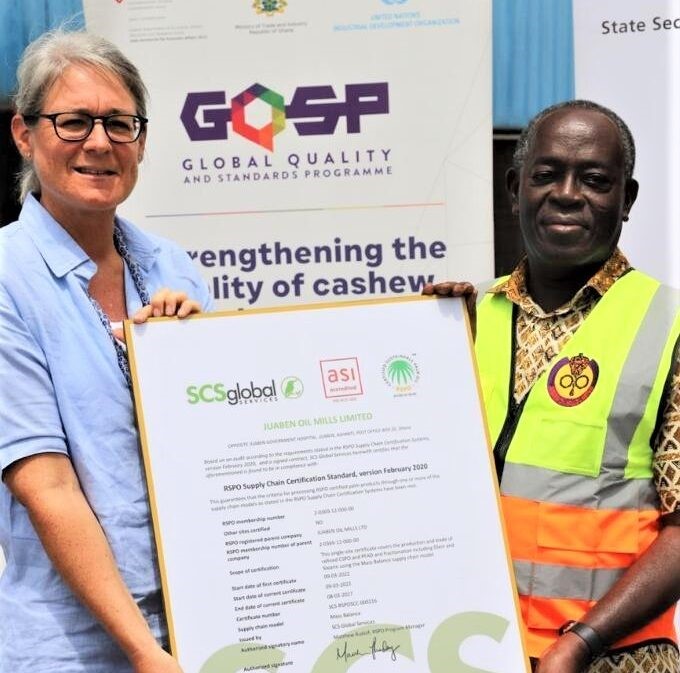The Juaben Oil Mill Limited (JOML) at Juaben in the Ashanti Region has made a significant stride in its quest to meet international standards, as it has attained a Roundtable for Sustainable Palm Oil (RSPO) Supply Chain Certificate, as part of efforts in enhancing sustainability in the production of the said company.
The RSPO certificate also seeks to give an assurance to the customer that the standard of palm oil produced by the Juaben-based factory is sustainable.
JOML is one of the five companies which were selected from the fifty listed companies and screened in Ghana by the United Nations Industrial Development Organisation (UNIDO) and Global Quality and Standard Programme (GOSP).
The journey for RSPO certification started when the company attained an ordinary RSPO membership number 2-0369-12-00-00. Fast forward to 2021, UNIDO under GOSP, through the sustainable West Africa Oil Palm Programme (SWAPP II) in collaboration with Solidaridad, with both projects funded by Switzerland’s government’s Centre of Excellence for all core issues relating to economic and labour market policy. The above-mentioned organisations worked together to access and select companies for support in RSPO certification.
Addressing the media after the presentation of the RSPO certificate to the JOML, Anne Schick, the acting Head of Corporation at the Switzerland Embassy, said the RSP certificate is a global standard that works on the sustainability of the palm oil supply chain.
On the relevance of the RSPO certification to a private entity like JOML, Anne told the media that, the government of Switzerland, through SECO, is doing development cooperation, and they need the private sector to work on poverty alleviation in Ghana.
Speaking to the Managing Director of Juaben Oil Mill, Mr. Alex Owusu, he explained that the RSPO comes with a standard that will afford the company the opportunity to operate on a larger scale, whereby they would deal with bigger companies such as Unilever and others.
“We went for RSPO because we want to expand our tentacles to other parts of the world, which will enable Juaben Oil Company to become a major player in the oil palm industry.”
Touching on challenges that the company has been encountering, he expressed worry about inadequate raw material –palm oil, calling for more palm plantations to help them operate on a larger scale.
Asked about the influx of foreign palm oil on the Ghanaian market, the MD disclosed that some of the importers do not pay the duty, and some of the products are cheaper in their countries of origin than theirs.
This development, he bemoaned, put them in a disadvantaged position in the minds of the consumer, because they are compelled to slash down the cost of their products in order to compete with the foreign products.
Juaben Oil Mills Ltd, which was incorporated in 1981, is the largest indigenous Oil Palm processing company in Ghana located at Juaben in the Ashanti Region. The Company’s operations encompass the entire oil palm value chain.
The Company is a member of the Ghana Chamber of Commerce, Association of Ghana Industries, and Oil Palm Development Association of Ghana (OPDAG).
The Company is fully regulated under the following mandatory Industrial regulatory bodies: Environmental Protection Agency (EPA), Food and Drugs Authority (FDA), Factory Inspectorate, and Ghana Standard Authority (GSA)
In 1997, the Ghana Investment Promotion Center (GIPC) in conjunction with the United Nations Industrial Development Organization (UNIDO) adjudged the Company as the best and most innovative small-scale industry in Ghana.
In 2014, the Ministry of Food and Agriculture adjudged the Company the National Best Oil Palm Farmer.
The journey toward the Roundtable for Sustainable Palm Oil (RSPO) certification started in 2012 when the Company attained ordinary RSPO membership with membership number 2-0369-12-00-00. In 2021, the United Nations Industrial Development Organization (UNIDO) under the Global Quality and Standard Program (GQSP) through the sustainable West Africa Oil Palm program II (SWAPP II)








